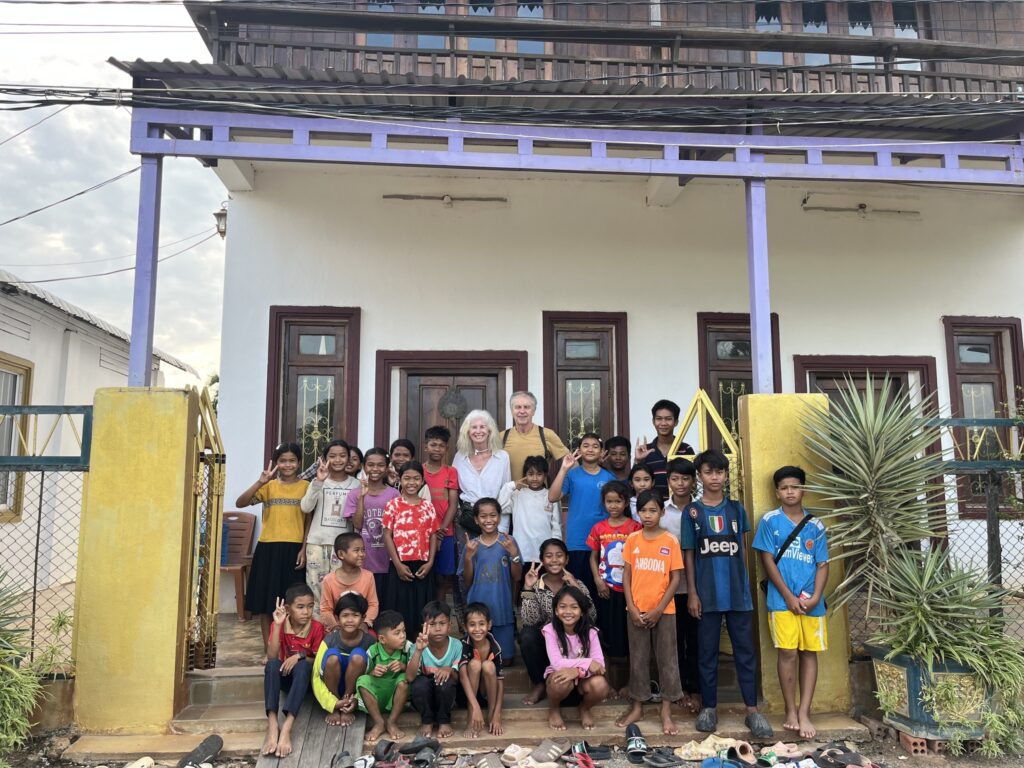Teach in Vietnam & Cambodia!
Teaching Jobs Abroad Programme – Cambodia
Dreaming of teaching in a country full of history, culture, and warmth? Our Teaching Job Abroad Program in Cambodia is perfect for TEFL-certified individuals ready to start teaching English — no guesswork, no stress, just support and success.
Complete our 9-day practicum in Phnom Penh and start teaching English at a local school — typically within 14 days!
Full Payment: $860
Deposit: $270
Applicants can pay a $270 deposit, with the remaining $590 due at least 14 days before the start date.
Why Teach in Cambodia?
Cambodia is an emerging ESL hotspot, known for its friendly communities, low cost of living, and growing demand for English teachers. Imagine living near the iconic temples of Angkor Wat, sipping iced coffee in Phnom Penh, and exploring hidden gems on weekends. Teaching in Cambodia offers a laid-back lifestyle with rich culture, meaningful work, and a chance to truly make a difference in students’ lives.
What’s Included in the Program?
- Pre-arrival support (visa guidance, insurance tips, documentation)
- 9 nights of accommodation (private room & bathroom)
- 9-day practical teaching preparation
- Welcome dinner & social event on day one
- 12-hour practicum: 6 hours of class observation + 6 hours of teaching practice
- Cultural immersion workshop
- Job readiness workshops (resume building, interview prep, local insights)
- Guaranteed job placement at a vetted partner school in Cambodia
- Ongoing support after job placement for housing, legal needs, and career planning
How It Works
- Get TEFL/TESOL Certified
Hold a valid TEFL/TESOL certification from a nationally recognized provider (or get certified through us!). - Secure Your Spot
Book your place in the program and receive pre-departure support with documents, visa guidance, and preparation. - Join the 9-Day Orientation
Arrive in Pnom Penh for a 9-day onboarding and practicum led by experienced ESL trainers. You’ll gain hands-on experience before heading to your placement. - Start Teaching in Just 2 Weeks
Begin your teaching journey at one of our trusted partner schools – often within just 14 days of arrival!
Why Join Our Teaching Jobs Abroad Program?
- Fast Job Placement
You can land your first ESL teaching job in as little as two weeks after arrival. - Real Classroom Experience
You’ll gain hands-on experience through classroom observation and supervised teaching practice. - Cultural & Professional Growth
Our cultural immersion and career development workshops help you feel at home and confident from day one. - Support You Can Count On
From airport arrival to housing, job interviews, and classroom management—we’re with you every step of the way. - Ideal for Certified Teachers
Already TEFL-certified? We’ll help you put your certification to use—fast.
What You'll Experience
From your very first week, you’ll join a diverse group of aspiring teachers for cultural activities, teaching workshops, and social events designed to build your confidence and community. You’ll observe classes led by experienced ESL teachers, then step into the classroom yourself—with full support and feedback.
After completing your practicum, our placement team will connect you with reputable ESL schools, often the same schools where you observed or taught. Our goal? To get you earning and teaching confidently—as soon as possible.
Ready to Start Teaching in Cambodia?
Start dates:
Who Can Apply?
- Must hold a TEFL, TESOL, or CELTA certificate from a government-accredited provider
- Must provide a clear background check
- Must have good English communication skills
- A bachelor’s degree
If you’re dreaming of teaching abroad but want a program that takes the stress out of job hunting, look no further.

Teaching Jobs Abroad Programme in Cambodia & Vietnam FAQs
Where will I meet your representative at the airport?
Ho Chi Minh City (International): After exiting the airport, walk through the barricades and turn left. Look for our Vietnam representative near upright pylon number 7, holding a sign with your name. If you have any issues, call the duty officer at +84 901 324 439 (international) / 0901 324 439 (local).
Hanoi (International): Exit the airport and head to upright pylon number 11, near the pedestrian bridge. A representative will be there holding a sign with your name. If needed, contact the duty officer at +84 906 284 339 (international) / 0906 284 339 (local).
What is the average class size for each TESOL/TEFL course?
In Ho Chi Minh City, each class typically has around 16 students. In Hanoi, the average class size is about 14 students.
Our TESOL programme attracts students from all over the world, with approximately 30% being non-native English speakers.
Can you share some details about the course structure and the types of assessment tasks involved?
Practicum
- Observation Classes: Trainees observe experienced ESL educators teaching real ESL classes in Vietnam, Cambodia, or an agreed-upon location for at least six hours.
- Teaching Practice: Trainees conduct hands-on teaching sessions with real ESL students in Vietnam, Cambodia, or another agreed location for a minimum of six hours. The first four hours are critically assessed, followed by constructive feedback.
Assessment
- 12 Units of Competency: Under the Australian Qualifications Framework, students are assessed as either ‘competent’ or ‘not yet competent.’ A certificate is awarded upon achieving competency in all 12 units of the Certificate IV in TESOL (11245NAT).
- Assessment Tasks: A combination of short and long answer questions, multiple-choice tests, resource development, practical teaching activities, video production, IT-based tasks, research, and report writing—without a final exam.
Time Commitment
- The estimated total commitment is 150 hours, considering clustered assessments.
- In-Class Students: Can complete the course in 4 to 6 weeks by working steadily each day.
- Online Students: Typically finish within 2 to 3 months at a flexible pace.
- Students must complete all 12 units and achieve competency within 6 months from the start date.
When will I receive my certificate after completing the course?
Your certificate will usually be ready at your training location about two weeks after you’ve submitted all required assessments and documents. This timeframe accounts for the independent assessment and issuance process, which takes place in Australia to ensure international recognition. You’ll receive an email notification once your certificate is available for pickup.
What documents should I bring with me?
In addition to your passport and visa, it’s essential to bring the following:
- The original copies of any qualifications you hold (degree/diploma).
- A background (police) check that is no more than six months old at the time of submission.
Note: It’s highly recommended that you have your qualifications and background check notarized and legalized in your home country.
Where can I obtain a background (police) check?
- Irish Citizens: Apply through the Irish National Police and Security Service here.
- American Citizens: The best option is an FBI background check, available here.
- United Kingdom Citizens: Obtain a basic background check here.
- Australian Citizens: Request a background check from the Australian Federal Police here.
- South African Citizens: Apply for a Police Clearance Certificate from the South African Police Service here.
- Canadian Citizens: Obtain a background check from the Royal Canadian Mounted Police here.
- Dutch Citizens: Request a background check from the Ministry of Justice and Security here.
- Swedish Citizens: Apply for a police record extract from the Swedish National Police Authority here.
- Norwegian Citizens: Obtain a background check from the Politiet Authority.
- Greek Citizens: Request a background check from the National Criminal Records Portal here.
- New Zealand Citizens: Apply through the Department of Justice here.
- Moroccan Citizens: Obtain a background check from the Department of Justice here.
- French Citizens: Request a police check from the Ministry of Justice here.
For citizens of other countries, check with the Department of Justice (or an equivalent authority) in your capital city.
Can my partner and I share a bedroom? Are we entitled to a discount?
Sharing a bedroom may be possible, depending on your specific program, personal circumstances, and the amount of notice given. We recommend discussing this directly with the course coordinator to explore any potential discounts.
How will I be assessed?
Assessment begins on the first day of the TESOL course, with factors like punctuality, attitude, and participation playing a key role. During weeks 1 to 3, you’ll complete the practical components, including 6 hours of classroom observation and 8 hours of assessed teaching practice, where detailed lesson plans are required. In week 4, you’ll submit a portfolio containing teaching and testing resources, a short research project, and a completed Workbook. There is no formal exam.
What does 'hands-on’ job help mean?
Once you have submitted your assessment tasks (due in week 4), we will assist you in creating a strong CV and begin connecting you with partner schools from their extensive network. Additionally, their team offers mock interviews, guidance on employment contracts, and insights into potential employers.
With a high demand for English teachers in Vietnam, job opportunities far exceed the number of qualified candidates. Most graduates secure a paid teaching position within 14 days of completing the course.
What’s the climate like there?
Ho Chi Minh City: Expect hot temperatures all year round, with the wet season from May to November bringing frequent heavy showers.
Hanoi: Experiences all four seasons, similar to other northern hemisphere countries. Summers are hot with high rainfall, while winters are cold and dry.
How many hours of teaching practice is included in the course?
Our TESOL course provides at least 14 hours of hands-on teaching experience with real students. The first 6 hours focus on observation, allowing you to gain insight into the ESL classroom by shadowing an experienced teacher. After that, you’ll complete a minimum of 8 hours
Is personal safety something I should be worried about?
Ho Chi Minh City, Hanoi, and Phnom Penh are generally as safe as major cities like New York, London, and Sydney. However, it’s always wise to stay alert, especially when carrying a bag or using your phone in public areas.
What are my housing options?
Ho Chi Minh City: We provide accommodation in both residential properties and local hotels, all within walking distance of the training center. Each trainee has a private bedroom and bathroom, equipped with air conditioning, WiFi, a bed with bedding, a wardrobe, a desk, and a chair. Residential properties include cooking facilities, whereas hotels do not. Laundry services are easily accessible. If you have a preference between a residential property or a hotel, inform the Course Coordinator in advance.
Hanoi: Accommodation is offered in hotels near the training center. Each trainee has a private room and bathroom with air conditioning, WiFi, a bed with bedding, a wardrobe, a desk, and a chair. Laundry services are readily available
I've heard some alarming stories about traffic congestion. Can you share more details about what to expect?
There’s no denying that traffic in all three TESOL locations can be hectic, but surprisingly, you’ll adapt to it over time.
What should I wear for the class?
When observing or teaching English classes, professional and culturally appropriate attire is required.
- For men: Acceptable clothing includes dress pants, a belt, a collared business shirt, lace-up black or brown shoes, and socks. While most schools require a tie, it is not mandatory with us.
- For women: Suitable attire includes slacks with a belt, a business-style blouse, comfortable shoes for long periods of standing, or a dress of an appropriate length—keeping in mind that some teaching activities may involve sitting or moving on the floor.
Casual clothing such as jeans, shorts, t-shirts, polo shirts, and sandals are not permitted during observations or teaching sessions. However, trainees may wear casual attire outside of these activities.
Is airport pickup available?
Yes, a door-to-door airport pickup service is offered 24/7. To arrange this, provide your arrival details as soon as possible, including the date, time, airline, and flight number. Please note that this service comes with a fee, which covers the round trip for the staff member, transportation costs, and up to three hours of waiting time in case of delays.
What are the best ways to stay connected with home?
We’ll assist you in getting a new SIM card for convenient local and international calls. Plus, with affordable and widely available internet, you can easily stay connected through Skype, Zoom, and other online platforms.
What if I leave before my certificate is ready for pickup?
Since the TESOL package doesn’t include a postage fee—most students (about 90%) collect their certificates in person—we don’t charge everyone for a service that many won’t need. However, if you’d like your certificate mailed to you, we can arrange it upon receiving a formal written request. You’ll only need to cover the exact postage cost set by the local postal service, with no additional fees.
Do I need to bring a laptop with me?
Bringing a laptop is essential for the TESOL course. If you don’t have one, you may have the option to rent a laptop from us for personal use.
Is it possible to have my certificate mailed to me instead of picking it up from the training location?
We can mail your certificate via secure delivery, but you will need to cover the postage fee set by the local postal service unless you include postage as an optional extra ($40 USD) in your initial application. Keep in mind that postage costs can be as high as $100 USD depending on the destination. Prepaid postage fees are non-refundable.
What is the duration of the in-class TESOL/TEFL program?
The TESOL course lasts approximately 150 hours over a span of four weeks. In the first three weeks, sessions typically run from Monday to Friday, 8:30 AM to 3:00 PM. Additionally, there will be evening and weekend commitments for class observations and teaching practice. The fourth week primarily focuses on assisting trainees in completing their required assessment tasks.




















